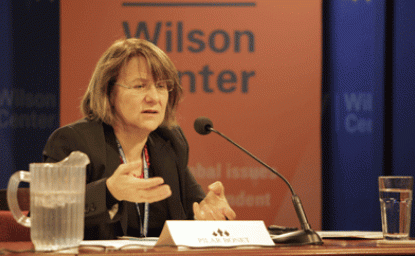Legacies of a Lost Empire: Unresolved Territorial and Identity Problems in the Post-Soviet Era


The people and communities that live in the frozen conflicts of Transnistria, Abkhazia, and South Ossetia are the "victims of a shipwreck" and "orphans of an empire," said Pilar Bonet, Chief Correspondent, Moscow, El Pais former Title VIII-supported Research Scholar, and Wilson Center Public Policy Scholar. At a 22 January 2013 presentation at the Kennan Institute, Bonet drew upon her experience as a Moscow-based correspondent who has traveled extensively to the area to outline the challenges facing those affected by these conflicts
Bonet asserted that the disintegration of the Soviet Union led to the creation of multiple territorial and identity conflicts such as those in Transnistria, Abkhazia, and South Ossetia. These conflicts stem from the legacy of the Russian empire and subsequently Stalin’s nationality policies of arbitrary borders designed to weaken opposition and strengthen the Soviet state.
After the collapse of the Soviet Union, the highest levels of the Soviet administrative structure, the 15 federative republics, were internationally recognized as sovereign states. Other autonomous republics, regions, and provinces were subordinated within these new states. There were as many as seventy potential territorial and identity conflicts following the fall of the Soviet Union, but only a few degenerated into bloody clashes. According to Bonet, these conflicts emerged out of cultural, ethnic and identity contestation to the "artificial drawing of borders and the reshuffling of territories" implemented during the Soviet times.
Bonet described the process by which the post-Soviet states were recognized as subjects of the International Community as "superficial" and "hasty." For example, the United Nations admitted all post-Soviet states within less than one year of the fall of the Soviet Union, with Georgia coming last in July 1992. Several of the states formed and admitted into the UN did not have the control over their respective territories and had not completely solved their respective territorial or identity disputes. Many of the potential conflicts, such as Tatarstan in the Russian Federation, and Crimea in the Ukraine, did not reach the extreme forms of confrontation some analysts predicted. Chechnya, the most violent uprising in the Russian Federation, was brutally repressed. Yet the territorial and identity conflicts of Transnistria, Abkhazia, and South Ossetia have endured, as well as Nagorno-Kharabakh, which is a case of its own.
Bonet stressed that in order to fully understand these conflicts they should be discussed in terms of how they affect the residents in these regions. Enormous barriers have been created between regions where only minimal travel was once necessary. Bonet’s colleague in North Ossetia was once was able to travel from his residence in Vladikavkaz to Tbilisi, Georgia for short trips. This is no longer possible because North Ossetia is currently cut off from Georgia and regular travel between the two cities is no longer permitted. A Georgian woman who resided in Tskhinvali, South Ossetia, could not visit her daughter nineteen miles away in Gori, Georgia because the travel restrictions required her to travel a significantly longer distance, putting the trip beyond her economic means.
These conflicts have also had a pernicious effect on economic development in the region as instability has delayed various projects that would otherwise boost economic prosperity. For instance, the Black Sea Highway project that would connect a total of twelve countries around the Black Sea in one complete highway system is stalled because of the conflict in Abkhazia.
Bonet recommended that the solutions to these conflicts be based on a regional level. In Bonet’s view, a regional framework would be better suited to facilitating an accord between the different sides. Ultimately, for any solution to be effective, it must de-emphasize the importance of borders. "Isolation is not the solution," Bonet stressed: It is unnatural for neighbors to ignore one another.
Unfortunately, Bonet contended, what originated as local problems have grown into strategic global issues because now international mediators and observers are involved. These mediators and observers, mainly the United States and Russia, have added their own geostrategic views to the local issues and have brought a lingering Cold War mentality to the negotiations. These outside pressures have prevented the parties concerned from concentrating on the task at hand. For example, when Yevgeni Shevchuk came to power in Transnistria he abolished certain controls in crossing the administrative border between Transnistria and Moldova, thereby bringing the two closer together. But despite such efforts, and even with the resolution of some of the root causes of the original confrontation, the Transnistria conflict lingers on.
"Complex realities need complex perspective," asserted Bonet. A critical and honest analysis of the process by which the post-soviet states were recognized is necessary to understand how these conflicts first arose and to begin to understand what is required for each solution: "we have to integrate the historical dimensions."
In keeping with her regional perspective, Bonet acknowledged that there is no stable solution for the conflicts without Russia’s participation, since the reality is that Russia is a key player in the region, no matter how much this position is questioned in the West. However, the problem with Moscow’s involvement lies in what Bonet referred to as the "Gorbachev syndrome." It is a perspective in the Kremlin rooted in the history of German reunification, when Gorbachev’s Western partners allegedly committed themselves not to enlarge NATO in exchange for his agreement not to oppose reunification. Moscow’s view towards these separatist conflicts is further shaped by the West’s recognition of Kosovo’s independence and the enlargement of NATO into Eastern Europe, both of which Moscow strongly opposed. As a result, Moscow’s perceived interest toward these frozen conflicts is focused less on solutions and more on preventing potentially undesirable strategic outcomes. Bonet cited the Russian Presidential Decree of 7 May 2012 in which Putin made no mention of the international context established for the negotiations on the Transnistria conflict (the so called "5 plus 2" mechanism), refusing to acknowledge the West as a player in this case.
Bonet underscored her contention that resolving these conflicts requires that the regional players and international observers and mediators think in terms of making the lives of the victims easier and more secure. If any enduring solution is to be reached, "the Cold War must be left behind." More than the fate of the individuals in the conflict zone is at stake, Bonet concluded: "These conflicts are a test for stability in Europe as a whole, and only after these conflicts are solved can we say that the Cold War is over."
Mackensie Knorr
Author

Kennan Institute
After more than 50 years as a vital part of the Wilson Center legacy, the Kennan Institute has become an independent think tank. You can find the current website for the Kennan Institute at kennaninstitute.org. Please look for future announcements about partnership activities between the Wilson Center and the Kennan Institute at Wilson Center Press Room. The Kennan Institute is the premier US center for advanced research on Eurasia and the oldest and largest regional program at the Woodrow Wilson International Center for Scholars. The Kennan Institute is committed to improving American understanding of Russia, Ukraine, Central Asia, the South Caucasus, and the surrounding region through research and exchange. Read more




